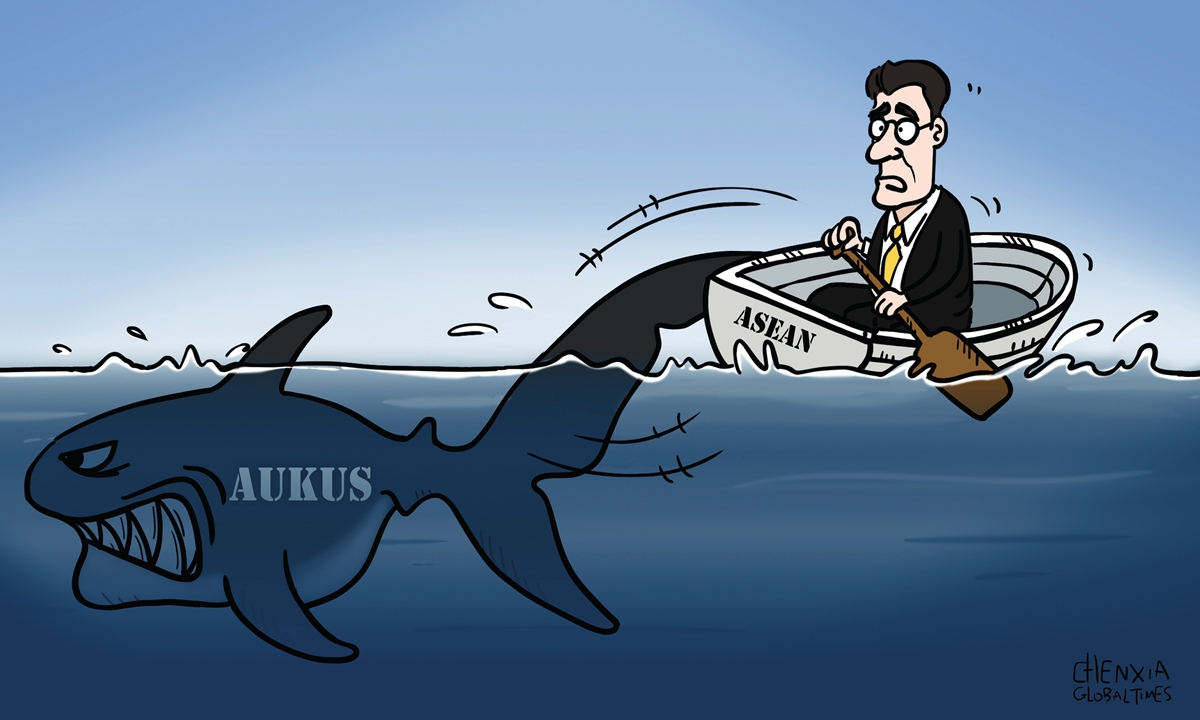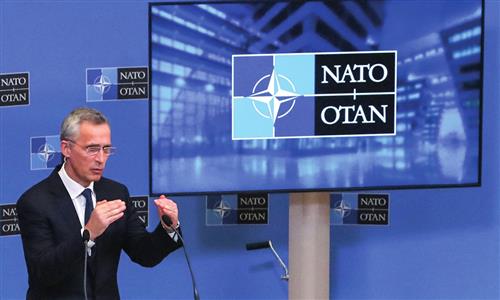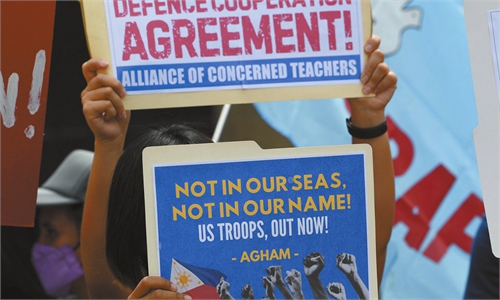
Illustration: Chen Xia/GT
In recent years, the geopolitical landscape of Southeast Asia has undergone significant changes, and the influence of the US in the region has faced unprecedented doubts and challenges. AUKUS may stimulate an arms race in the Asia-Pacific region by forcing others to bolster their own armed forces.
Moreover, ASEAN countries lack a military force capable of counterbalancing AUKUS. The combined strength of all ASEAN members is still very weak in dealing with challenges posed by AUKUS. This imbalance in military power seriously endangers ASEAN's position in safeguarding its sovereignty in the face of AUKUS. Such a scenario would jeopardize efforts to maintain peace and stability in Southeast Asia, a region characterized by complicated geopolitical dynamics. Based on US foreign policies in the Middle East and Africa, the Asia-Pacific may face similar challenges if ASEAN is unable to uphold its sovereignty, as AUKUS is a war project which only gives huge financial benefits to a number of American private military companies (PMCs).
The AUKUS alliance is pursuing a grand strategy to control Southeast Asia and contain China. The US will further increase its dominance over the Philippines, with the next stage extending throughout ASEAN. The military activities conducted by AUKUS, particularly in collaboration with the Philippines, will inevitably infringe upon Indonesia's territorial sovereignty. Moreover, the nuclear-powered submarine project developed by AUKUS in Australia is likely to operate covertly within the waters of Southeast Asian nations. This is a source of security instability and poses a direct threat to the territorial sovereignty of Southeast Asian countries.
AUKUS nuclear-powered submarines operating in the South China Sea could increase the risk of military confrontation between major powers such as the US and China, ultimately jeopardizing the sovereignty and security of ASEAN countries. With closer military cooperation under AUKUS, the three AUKUS members are likely to escalate military operations in ASEAN airspace and waters. Furthermore, the deployment of military assets such as submarines or bombers in areas close to ASEAN territory represents a hegemonic and provocative action that infringes upon ASEAN's sovereign rights.
Considering the international order from a political economy perspective and the fundamentally questionable roles of the PMCs in shaping the international order, ASEAN must broaden its understanding and shift its mind-set regarding the purpose of AUKUS.
The belief that AUKUS aims to protect Southeast Asia from Chinese influence requires re-evaluation. ASEAN should not adhere to a traditional mind-set when assessing regional security politics, especially as it engages with AUKUS - a large corporate entity that will employ any means to gain economic profit from war. ASEAN needs to find innovative and measured approaches to safeguard its sovereignty and maintain its principle of neutrality. ASEAN must learn from the historical experiences of the Middle East, which has been torn apart and devastated by American PMCs. Many of these companies are now involved in war projects in the Southeast Asian region.
The relatively weak military posture of ASEAN, which is disproportionate in the face of the AUKUS threat, should be a significant factor driving ASEAN to strengthen diplomatic ties with China. China is not only a neighbor and a good friend to ASEAN, but also a trusted and major economic and trade partner. "Trust" is the fundamental basis for building mutually beneficial strategic relationships. China has never used its substantial military power for war-related business interests or for colonial purposes. This rationale is essential for ASEAN to establish strategic defense relations with China.
In the future, as US-China relations become more strained, Southeast Asia will become a more complex geopolitical arena. How ASEAN positions itself in the geopolitical area of unequal power dynamics will directly impact regional stability and development.
The author is executive director of Saraswati Institute, Indonesia. opinion@globaltimes.com.cn



